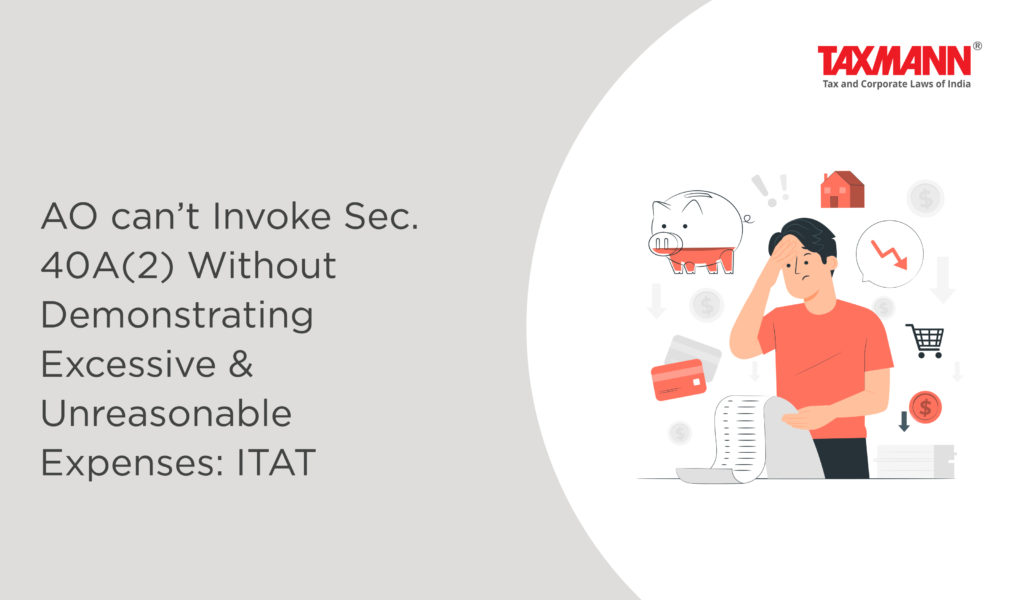AO can’t Invoke Sec. 40A(2) Without Demonstrating Excessive & Unreasonable Expenses: ITAT
- Blog|News|International Tax|
- 3 Min Read
- By Taxmann
- |
- Last Updated on 16 June, 2023

Case Details: Technip Energies Italy SPA v. Deputy Commissioner of Income-tax - [2023] 150 taxmann.com 525 (Delhi-Trib.)
Judiciary and Counsel Details
-
- G.S. Pannu, President & Saktijit Dey, Judicial Member
- Ajay Vohra, Sr. Adv. & Anshul Sachhar, Adv. for the Appellant.
- Gangadhar Panda, CIT (DR) for the Respondent.
Facts of the Case
Assessee, an Italian company, entered into a contract with an Indian company for the execution of grass root hydrogen generation unit and fuel gas unit on lump sum turnkey basis. During the assessment proceedings, it was fo und that the assessee had significant transactions with its related parties, as disclosed in the notes to financial statements but did not submit any benchmarking analysis to justify the said expenses in relation to its related parties.
While framing the draft assessment order, the Assessing Officer (AO) rejected the books of account, alleging non-furnishing financial statements and other documents. He proceeded to estimate profit attributable to PE at the rate of 10% by invoking the provision of section 44BBB(1).
However, the Dispute Resolution Panel (DRP) reversed the decision of AO to reject the books of account.
While implementing the directions of DRP in the final assessment order, AO found that the assessee had significant transactions with its related parties, as disclosed in the notes to financial statements. He observed that the assessee had not submitted any benchmarking analysis to justify that the said expenses in relation to its related parties are not unreasonable as per section 40A(2)(b). Thus, he held that the assessee’s books of account could not be relied upon, and profit attribution must be made as per rule 10(i).
Aggrieved-assessee filed the instant appeal before the Delhi Tribunal.
ITAT Held
The Tribunal held that the assessee furnished all necessary and relevant documents, including audited financial statements, Audit Reports/invoices etc., to justify its claim. Even, the assessee furnished detailed replies to various queries made by the AO. Thus, the assessee discharged its onus with reference to the expenses. There was no obligation on the part of the assessee to furnish any benchmarking analysis in relation to such transaction.
As per the provisions of section 40A(2)(a), AO has to form an opinion not in a vacuum but based on cogent material that the expenses/payments made by the assessee to the related parties are excessive and unreasonable having regard to the fair market value of goods or services.
In the instant case, the AO did not demonstrate in what manner the opinion was formed that the expenses with reference to related parties are excessive and unreasonable regarding the fair market value. AO has not referred to even a comparable case of similar expenses to demonstrate that the payments/expenses made by the assessee are excessive and unreasonable and more than fair market value.
Thus, AO failed to discharge the burden cast upon him under section 40A(2)(a).
List of Cases Referred to
-
- ESPN Star Sports, Mauritius S.N.C. ET Compagnie v. Union of India [2016] 68 taxmann.com 377/241 Taxman 38/388 ITR 383 (Delhi) (para 9)
- Global One India (P.) Ltd. v. Dy. CIT [2019] 112 taxmann.com 185/[2020] 182 ITD 355 (Delhi – Trib) (para 9)
- L.G. Electronics Inc. v. Dy. CIT [2019] 109 taxmann.com 36 (Delhi. – Trib.) (para 9)
- Software Paradigms Infotech (P.) Ltd. v. Asstt. CIT [2018] 89 taxmann.com 399 (Bang. – Trib.) (para 9)
- CIT v. Enviro Control Associated (P.) Ltd. [2014] 43 taxmann.com 291/225 Taxman 56 (Guj.) (Mag.) (para 10)
- Voltamp Transformers (P.) Ltd. v. CIT [1981] 5 Taxman 253 (Guj.) (para 10)
- CIT v. Modi Xerox Ltd. [2011] 10 taxmann.com 73/199 Taxman 321 (Mag.)/337 ITR 103 (Delhi) (para 10)
- CIT v. Paradise Holidays [2010] 195 Taxman 291 (Delhi) (para 11)
- Madnani Construction Corporation (P.) Ltd. v. CIT [2008] 296 ITR 45 (Gau.) (para 11)
- CIT v. Hyundai Heavy Industries Co. Ltd. [2007] 161 Taxman 191 (SC) (para 13).
Disclaimer: The content/information published on the website is only for general information of the user and shall not be construed as legal advice. While the Taxmann has exercised reasonable efforts to ensure the veracity of information/content published, Taxmann shall be under no liability in any manner whatsoever for incorrect information, if any.

Taxmann Publications has a dedicated in-house Research & Editorial Team. This team consists of a team of Chartered Accountants, Company Secretaries, and Lawyers. This team works under the guidance and supervision of editor-in-chief Mr Rakesh Bhargava.
The Research and Editorial Team is responsible for developing reliable and accurate content for the readers. The team follows the six-sigma approach to achieve the benchmark of zero error in its publications and research platforms. The team ensures that the following publication guidelines are thoroughly followed while developing the content:
- The statutory material is obtained only from the authorized and reliable sources
- All the latest developments in the judicial and legislative fields are covered
- Prepare the analytical write-ups on current, controversial, and important issues to help the readers to understand the concept and its implications
- Every content published by Taxmann is complete, accurate and lucid
- All evidence-based statements are supported with proper reference to Section, Circular No., Notification No. or citations
- The golden rules of grammar, style and consistency are thoroughly followed
- Font and size that’s easy to read and remain consistent across all imprint and digital publications are applied



 CA | CS | CMA
CA | CS | CMA
